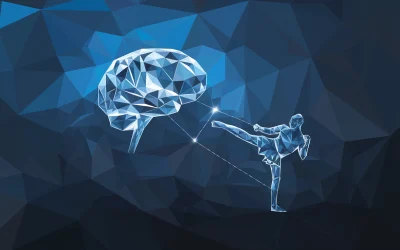The way you approach learning Brazilian Jiu-Jitsu can have a major impact on your progress and development as a grappler. There are two main learning theories that can be applied to acquiring and improving BJJ skills – the information processing model and the ecological approach. Understanding the key differences between these theories can help you determine the most effective training methods.
The Information Processing Model for Learning BJJ
The information processing model views the mind like a computer, with inputs, processes, and outputs. According to this theory, learning happens in stages:
Sensory Input
The first stage is taking in sensory information, like seeing a technique demonstrated or hearing verbal instruction. The quality of this input affects learning. Clear, high-quality sensory data is processed more effectively.
Short-Term Memory
Next, the information enters short-term memory where it is rehearsed and temporarily stored. Strategies like repeating the name of a technique out loud improves short-term retention.
Long-Term Memory
With repetition and practice, the information is encoded into long-term memory. The key is translating short-term memories into durable long-term ones through training.
Response Output
Finally, the stored information is retrieved from memory and applied through a response output, like performing the technique in live rolling. Output demonstrates successful storage and application.
The information processing approach works sequentially, building up memory through quality input, rehearsal, encoding, and performance. Let’s compare this to the ecological model.
The Ecological Approach to Learning BJJ
Rather than seeing the mind as a computer, the ecological approach views people as active perceivers in their environment. Learning is centred around the relationship between perception and action.
According to this theory, skill acquisition is based on detecting meaningful patterns and opportunities for action in context. The focus is on picking up on informational variables and responding appropriately through movement.
For example, an ecological learner would focus on cues like feeling pressure and weight distribution while rolling, and reacting instinctively based on those variables. The emphasis is on tuning perception and perfecting actions, rather than mentally processing inputs.
Key Principles of The Ecological Approach to BJJ
Some key principles of the ecological approach include:
- Perception-action coupling – perception continuously guides action and movement in context
- Information pickup – detecting meaningful patterns in the training environment
- Affordances – opportunities for action based on perceived cues
- Adaptability – skills emerge from variable practice conditions
Rather than step-by-step processing, skills are acquired through active exploration, intention, refinement, and adaption to ever-changing conditions.
Comparing the Models for Learning BJJ
How do these theories translate into actual BJJ training? Here are some comparisons between an information processing and ecological approach:
Information Processing Model
-Focus on conceptual knowledge -Break techniques into steps -Master solo drills for memory encoding -Gain high-quality visual information -Verbalize movements out loud -Mentally rehearse techniques
Ecological Approach
-Emphasize perception-action coupling -Practice adapting techniques fluidly -Respond to live training cues and pressure -Focus on movement feel and body positioning -Minimize conceptual verbal cues -Develop intrinsic feedback attunement
The information processing approach utilizes conceptual understanding, part-practice, and repetition to solidify techniques mentally. The ecological model favours adaptable, variable movements and honing intrinsic feedback for fast, intuitive skills.
Blending the Models
Most BJJ training likely utilizes elements of both theories. For example, beginners need some conceptual models and part-practice to build a basic technical knowledge. However, more advanced students develop faster by focusing more on live, variable practice.
Here are some suggestions for blending the approaches:
- Use conceptual models to develop initial skill comprehension
- Breakdown complex techniques but also practice holistically
- Build adaptable skills by varying live training environments
- Hone intrinsic feedback reading skills for faster reactions
- Blend some mental rehearsal and walkthroughs with live contextual practice
The information processing and ecological models represent two ends of the learning continuum. Integrating elements of both approaches can give you the benefits of conceptual understanding and skill adaptability.
Apex MMA’s Approach to Teaching BJJ
Here at Apex MMA, our BJJ curriculum strives to incorporate the best aspects of the information processing and ecological learning theories. Early on, students get high-quality conceptual and technical instruction to build a knowledge foundation. We break down positions and submissions, and use drills and repetition to encode the motor patterns.
However, we also understand the need to develop adaptable skills. So we quickly transition students into live, variable training with progressive resistance and unpredictability. Our classes are structured around tuning perception skills and intrinsic feedback while rolling and sparring in environments that mimic competition. This gives our students the benefits of ingraining technique as well as the ability to react and adapt under pressure.
BJJ Learning Theories Compared
How you learn BJJ can impact your ability to perform when it matters most. Understanding the information processing and ecological models provides you with two useful theories for structuring your training. Blend conceptual knowledge and tunable skills for fast adaptation. Approach your training with intention based on proven learning principles.




0 Comments